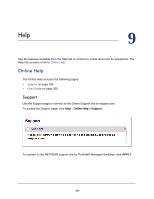Netgear GSM7212F GSM5212P/GSM7212P/GSM7212F/GSM7224P User Manual - Page 350
Ping IPv6, Address/Host Name, Count, Intervalsecs, Datagram Size, CANCEL, APPLY, Maintenance
 |
View all Netgear GSM7212F manuals
Add to My Manuals
Save this manual to your list of manuals |
Page 350 highlights
Web Management User Guide 1. Use IP Address/Host Name to enter the IP address or Hostname of the station you want the switch to ping. The initial value is blank. The IP Address or Hostname you enter is not retained across a power cycle. 2. Optionally, configure the following settings: • Count - Enter the number of echo requests you want to send. The initial value is default value. The Count you enter is not retained across a power cycle. • Interval(secs) - Enter the Interval between ping packets in seconds. initial value is default value. The Interval you enter is not retained across a power cycle. • Datagram Size - Enter the Size of ping packet. initial value is default value. The Size you enter is not retained across a power cycle. 3. PING displays the result after the switch sends a Ping request to the specified address. 4. Click CANCEL to cancel the operation on the screen and reset the data on the screen to the latest value of the switch. 5. Click APPLY to send the ping. The switch sends the number of pings specified in the Count field, and the results are displayed below the configurable data in the Ping area. Ping IPv6 This screen is used to send a Ping request to a specified Hostname or IPv6 address. You can use this to check whether the switch can communicate with a particular IPv6 station. Once you click the APPLY button, the switch will send three pings and the results will be displayed below the configurable data. The output will be Send count=3, Receive count=n from (IPv6 Address). Average round trip time = n ms. To access the Ping IPv6 page, click Maintenance Troubleshooting Ping IPv6. 1. Use Ping to select either global IPv6 Address, Hostname, or Link Local Address to ping. 2. Use IPv6 Address/Hostname to enter the IPv6 address or Hostname of the station you want the switch to ping. The initial value is blank. The IPv6 Address or Hostname you enter is not retained across a power cycle. 3. Use Datagram Size to enter the datagram size. The valid range is (48 to 2048). 350















